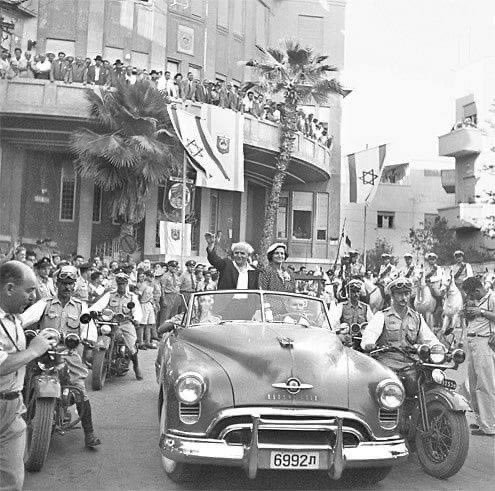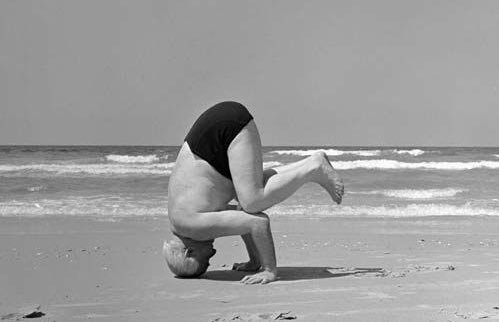#David Ben Gurion
Text
“Why should the Arabs make peace? If I was an Arab leader, I would never make terms with Israel. We have taken their country. Sure, God promised it to us, but what does that matter to them? Our God is not theirs. We come from Israel but 2000 years ago, and what is that to them? There has been anti-Semitism, the Nazis, Hitler, Auschwitz, but was that their fault? They only see one thing: We have come here and stolen their country. Why should they accept that?”
- David Ben-Gurion, Israel's first PM
429 notes
·
View notes
Text
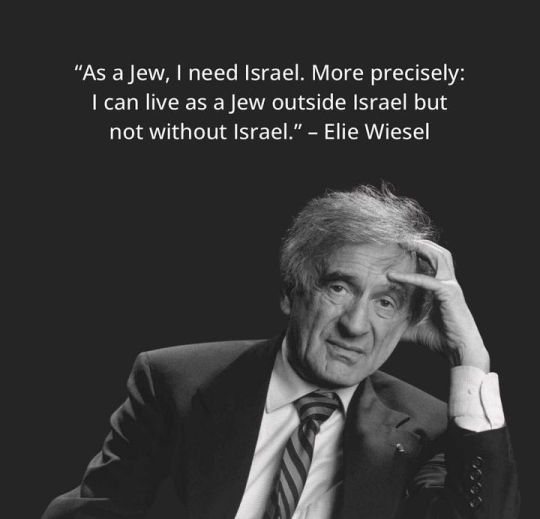

Source : humans of Judaism on Instagram.
35 notes
·
View notes
Quote
Proposals to physically transfer Palestinians out of the country have a long history in Zionism. Theodor Herzl confided in his diaries: “We shall try to spirit the penniless population across the border by procuring employment for it in the transit countries, while denying it employment in our own country.” Israel Zangwill, the Jewish writer who coined the phrase “A land without a people,” complained that Palestine is not so much occupied by the Arabs as overrun by them.” Invoking the Boer’s Great Trek in South Africa, he proposed that “we must greatly persuade [the Arabs] to ‘trek’. After all, they have all Arabia with its million square miles – not to mention the vast new area freed from the Turk between Syria and Mesopotamia – and Israel has not a square inch.” If they “fold their tents” and “silently steal away,” he felt sure that the Jews would be prepared to pay their travelling expenses. Ben-Gurion, the architect of the Nakba, had long advocated for “compulsory transfer.” In 1937, he established a Committee on Population Transfer within the Jewish Agency. And, of course, transfer, a euphemism for ethnic cleansing, was in fact carried out at a mass level in 1948 and again in 1967. One of its most notorious perpetrators, Yosef Weitz, the Director of the Jewish National Fund’s Land Settlement Department, wrote:
'It must be clear that there is no room in the country for both peoples … The only solution is a Land of Israel without Arabs…. There is no way but to transfer the Arabs from here to the neighbouring countries, to transfer all of them, perhaps with the exception of Bethlehem, Nazareth and the old Jerusalem. Not one village must be left, not one tribe.'
Jeff Halper, Decolonizing Israel, Liberating Palestine: Zionism, Settler Colonialism, and the Case for One Democratic State
199 notes
·
View notes
Text

This is Swedish diplomat Folke Bernadotte who personally saved 31,000 Jews and non-Jews from the Nazi Germany…🇩🇪
He was chosen to be the United Nations Security Council mediator in the Palestine–Israeli conflict of 1947–1948…
The Zionists killed him in Jerusalem after he wrote his UN report detailing the devastated Palestinian villages he saw and the mass killings…🇮🇱🇵🇸
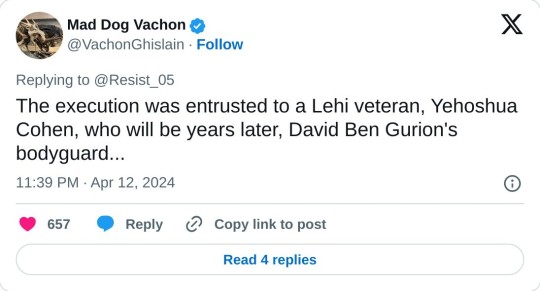
#zionsim is terrorism#zionist#free palestine#gaza#israel#free gaza#palestine#fuck the idf#antisemitism#jerusalem#current events#david ben gurion
9 notes
·
View notes
Quote
Without moral and intellectual independence, there is no anchor for national independence.
David Ben-Gurion
#quote#quotes#dailyquote#dailyquotes#themedquote#themedquotes#kawttonkandii#4thofjulyquote#4thofjulyquotes#4thofjuly#happy 4th of july#freedom#independence#liberty#moral#intellectual#david ben gurion
4 notes
·
View notes
Text
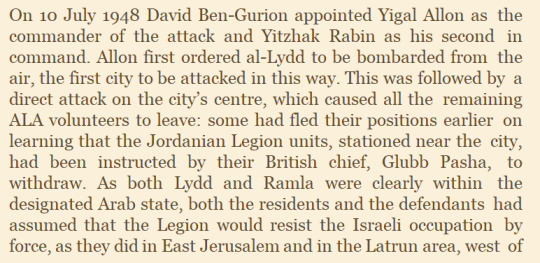

The Ethnic Cleansing of Palestine - Ilan Pappé (2006)
#Palestine#Israel#Free Palestine#Free Gaza#David Ben Gurion#Ben Gurion#Yigal Allon#Yitzhak Rabin#al-Lydd#ALA#Jordanian Legion#Glubb Pasha#Britain#Lydd#Ramla#Jerusalem#Legionaries#Dahamish Mosque#massacre#cw violence#cw death#West Bank#Nakba#The Ethnic Cleansing of Palestine#Ilan Pappé#ethnic cleansing#zionism#nsnv#colonialism
0 notes
Text
Courage is a special kind of knowledge: the knowledge of how to fear what ought to be feared and how not to fear what ought not to be feared.
—David Ben-Gurion
0 notes
Text
I think it says a lot about how Zionism is so deeply entrenched in American culture that Chris Claremont’s model for the politics of Professor X and Magento was not Martin Luther King and el-Hajj Malik el-Shabazz, respectively, but rather David Ben-Gurion for Professor X and Menachem Begin and Meir Kahane for Magneto. The fact that people claim that MLK and Malcolm X were the inspirations almost feels like a way to cover up that Zionist inspiration, but it’s an ugly truth.
#Zionism#Anti Zionism#Chris Claremont#martin luther king jr#MLK#el-Hajj Malik el-Shabazz#Malcolm X#David Ben-Gurion#Menachem Begin#Meir Kahane#Marvel#Marvel Comics#X-Men#Charles Xavier#Professor X#Max Eisenhardt#Erik Lehnsherr#Magneto#Israel#Palestine#Free Palestine#Mewaddlee’s Posts
14 notes
·
View notes
Text
by Martin Kramer
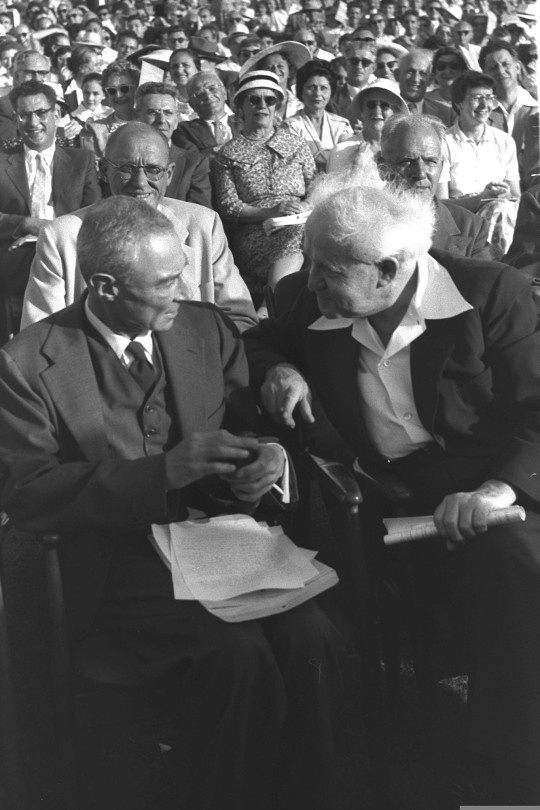
The text may help to explain a remark made by Israeli prime minister David Ben-Gurion to the Israeli cabinet, after he’d met with Oppenheimer at the latter’s request. Ben-Gurion said he “had the impression that some sort of Jewish spark lit up the man.”
That impression may have originated in Oppenheimer’s speech. Ben-Gurion certainly heard it. The prime minister delivered the keynote at the same dedication, and sat with Oppenheimer in the front row. Oppenheimer, in his own speech, made several references to Ben-Gurion’s remarks. (When Oppenheimer said “It is not only the Prime Minister of Israel who has his difficulties,” he was referring to Ben-Gurion’s admission that he didn’t understand much about physics.)
What’s the source for Oppenheimer’s text? Oppenheimer spoke from notes, but he didn’t have a copy of the speech as he delivered it. “I gave my notes on the ceremonial talk to your press officer,” he wrote to Meyer Weisgal, his host, “and have no record at all of what I said.” At Oppenheimer’s request, the Weizmann Institute sent him a tape with the extract of his speech, secured from the Voice of Israel, which had broadcast the proceedings. The following text is a transcription of the delivered speech, from Oppenheimer’s papers. While the Jerusalem Post reported a few portions of his remarks the day after he spoke, the speech is published here in full for the first time.
I’ve appended an extract from another speech that Oppenheimer gave for the Weizmann Institute on December 2, 1958, at its annual fundraiser at the Waldorf-Astoria Hotel in New York. There Oppenheimer reflected on his visit to Israel the previous May. It complements the Rehovot speech.
Some of the persons mentioned by Oppenheimer in the two speeches:
Niels Bohr, Danish physicist and 1922 Nobel laureate. Although baptized a Lutheran, his mother came from a distinguished Jewish family, so he fled Denmark during the Nazi occupation. He later assisted Oppenheimer in the Manhattan Project. Bohr had already lent his prestige to the Weizmann Institute during an earlier visit in 1953, and he also spoke at the 1958 dedication, for which the Institute commissioned his bust.
Meyer Weisgal, Zionist author and fundraiser, and confidant of the late Chaim Weizmann. At this time, he was chairman of the executive council of the Weizmann Institute. He would become the person in Israel closest to Oppenheimer.
Benjamin Bloch, physicist by training, administrator of the Weizmann Institute, and a friend of Bohr and Oppenheimer. (Felix Bloch, the Swiss-American physicist and 1952 Nobel laureate, also attended the 1958 dedication, but Oppenheimer’s reference to “Dr. Bloch” clearly refers to Benjamin.)
Abba Eban, Israeli statesman. In late 1958, he was at the end of his service as Israeli ambassador to the United States and chief delegate to the United Nations, and had been named the next president of the Weizmann Institute.
Ernest (later Lord) Rutherford, New Zealand-British physicist and 1908 Nobel laureate, a friend to Chaim Weizmann in Manchester.
17 notes
·
View notes
Text
Chi non crede nei miracoli non è realista.
David Ben-Gurion
19 notes
·
View notes
Text
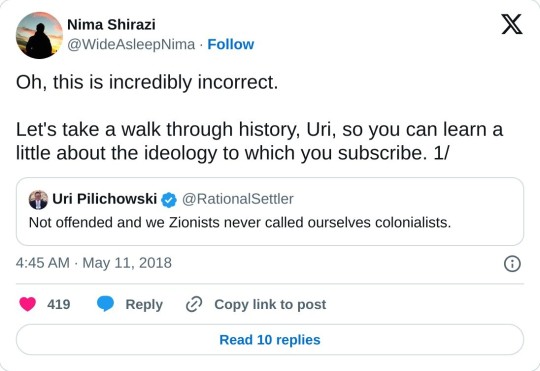
In 1862's 'Rome and Jerusalem,' perhaps the earliest Zionist text, Moses Hess asked France to "help the Jews to found colonies which may extend from Suez to Jerusalem and from the banks of the Jordan to the coast of the Mediterranean." 2/
In late August 1898, the Second Zionist Congress established the Jewish Colonial Trust, the financial arm of the World Zionist Organization and the first official Zionist bank. In 1902, the Anglo-Palestine Company Ltd. was founded as a subsidiary of the Jewish Colonial Trust. 3/
In 1902, Theodor Herzl, father of political Zionism, begged Cecil Rhodes to support the Zionist project and facilitate Jewish settlement of Palestine. Zionism was in Britain's imperial interest, Herzl suggested, "Because it is something colonial." 4/
Revisionist Zionist leader Vladmir Jabotinsky, who founded and led the Irgun militia, wrote explicitly in his 1923 Zionist manifesto, "The Iron Wall," that "Zionism is a colonization adventure and therefore it stands or it falls by the question of armed force." 5/
Jabotinsky also wrote, "Zionist colonization, even the most restricted, must either be terminated or carried out in defiance of the will of the native population," and that it was "necessary to carry on colonization against the will of the Palestinian Arabs." 6/
One of the leading Zionist organizations supporting the Yishuv (Jewish settlers) in Mandatory Palestine was the Palestine Jewish Colonization Association, established in 1924. (It was originally founded in 1891 as the Jewish Colonization Association.) 7/
The Jewish Agency, formed in 1929 by the 16th Zionist Congress, was (and is still) tasked with increasing Jewish immigration to Palestine. Its fundraising arm originally operated under the auspices of World Zionist Organization's aptly-named "Colonization Department." 8/
On October 5, 1937, David Ben-Gurion - later Israel's first prime minister - sent a letter to his son Amos in which he wrote that "Palestine...contains vast colonization potential which the Arabs neither need nor are qualified (because of their lack of need) to exploit." 9/
In mid-1947, the Jewish Agency presented its position to the United Nations Special Committee on Palestine. It declared "industrial development in Palestine" was "part of...the migration of industry from the old industrial countries to colonial or semi-colonial territories." 10/
During the presentation, Chaim Weizmann-later Israel's 1st president-stated, "As compared with the result of the colonizing activities of other peoples, our impact on the Arabs has not produced very much worse results than what has been produced by others in other countries." 11/
Moshe Shertok-Israel's 2nd prime minister-boasted of Zionism to the UNSCOP, saying "it will not be easy to find an instance in the history of colonization where a large scale settlement scheme has been conducted with so much respect for the interests of existing population." 12/
Clearly, Zionism's colonial nature was explicit from the outset and was leveraged as a selling point to gain European support. When colonialism began to lose legitimacy, the term was retired.
So don't ever claim that "we Zionists never called ourselves colonialists."
13/END
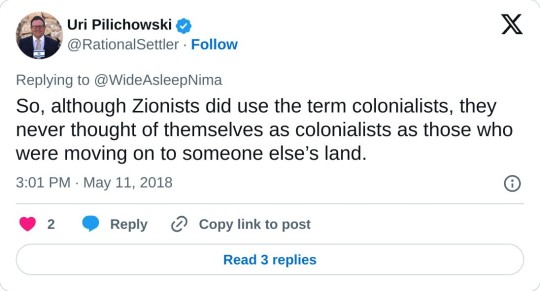
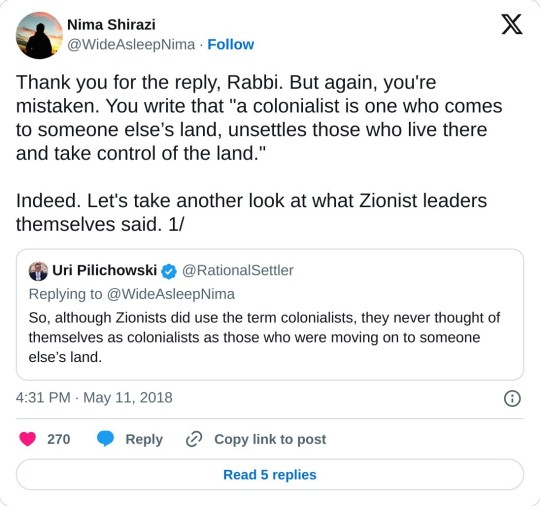
In 1891 leading Zionist thinker Asher Ginsburg (Ahad Ha'am) wrote that "when the life of our people in Palestine will develop to such an extent as to push out, to a small or large extent, the indigenous population of the country, then not easily will they give up their place." 2/
In 1898, Theodor Herzl recognized that, in order to establish a "Jewish state" in Palestine, the inconvenient indigenous population would have to be removed. “We shall try to spirit the penniless [Palestinian Arab] population (i.e. Arab) across the border," he wrote. 3/
Israel Zangwill, British leader of the Jewish Territorialist Organization (ITO), wrote in 1904 of "a difficulty from which the Zionist dare not avert his eyes, though he rarely likes to face it." It was that "Palestine proper has already its inhabitants." 4/
So what was his solution? "We must be prepared...to drive out by the sword the tribes in possession as our forefathers did."
Similarly, Chaim Weizmann referred to Palestinians as "the rocks of Judea, as obstacles that had to be cleared on a difficult path." 5/
his 1926 address to Nat'l Conference of the United Palestine Appeal in Boston, Weizmann said Palestinians "are in the country, and have been there for ages. We are the newcomers and have to become part and parcel of the country. We are planting a new people in the country. 6/
In 1929, early Labor Zionist intellectual Berl Katznelson declared, "Zionist enterprise is an enterprise of conquest," admitting that "it is by no chance that I use military terms when speaking of settlement." 7/
In 1930, Menachem Usshishkin, a powerful early pioneer of Zionism and leading member of the Jewish National Fund, stated, "If there are other inhabitants there [in Palestine], they must be transferred to some other place. We must take over the land." 8/
in 1936, Ussishkin commented, "Now the [Palestinian] Arabs do not want us because we want to be the rulers. I will fight for this. I will make sure that we will be the landlords of this land...because this country belongs to us not to them." 9/
In 1936, another leading Zionist, Arthur Ruppin, who led colonization efforts through the Jewish National Fund, declared, "On every site where we purchase land and where we settle people, the present cultivators will inevitably be dispossessed." 10/
In June 1937, David Ben-Gurion wrote to Jewish Agency head Moshe Shertok, "Were I an Arab...I would rebel even more vigorously, bitterly, and desperately against the immigration that will one day turn Palestine and all its Arab residents over to Jewish rule." 11/
Ben-Gurion told the 20th Zionist Congress in August 1937, "New Jewish settlement will not be possible unless there is a transfer of the Arab peasantry," adding, "Jewish power in the country...will also increase our possibilities to carry out the transfer on a large scale." 12/
At the November 21, 1937 meeting of Jewish Agency's Transfer Committee, Yosef Weitz, Land Department chief at the Jewish National Fund, boasted that "transfer" not only "diminish[es] the Arab population," but also "release[s] it for Jewish inhabitants." 13/
In 1938, Ben-Gurion reaffirmed these sentiments: "Let us not ignore the truth among ourselves. Politically we are the aggressors and they defend themselves. The country is theirs, because they inhabit it, whereas we want to come here and settle down." 14/
At the same time, Ussishkin insisted, "We cannot start the Jewish state with...half the population being Arab...Such a state cannot survive even half an hour." Regarding the forcible ethnic cleansing of over sixty thousand Palestinian families, he added: "It is most moral." 15/
Ruppin agreed: "I do not believe in the transfer of individuals. I believe in the transfer of entire villages." He also wrote, "Land is the most necessary thing for establishing roots in Palestine...We are bound in each case...to remove the peasants who cultivate the land." 16/
Moshe Shertok, Jewish Agency chief and later Israel's second prime minister, said, "We have forgotten that we have not come to an empty land to inherit it, but we have come to conquer a country from people inhabiting it." 17/
On March 20, 1941, the Jewish Agency's Yosef Weitz wrote, "The complete evacuation of the country from its other inhabitants and handing it over to the Jewish people is the answer." 18/
In 1941, Weitzmann told Ivan Maisky, Soviet ambassador to England, that "if half a million Arabs could be transferred, two million Jews could be put in their place. That, of course, would be a first installment; what might happen afterwards [would be] a matter for history." 19/
In a 1941 memorandum entitled "Outlines of the Zionist Policy", Ben-Gurion recognized that "the majority of the Arabs could hardly be expected to leave voluntarily," noting, "Complete transfer without compulsion – and ruthless compulsion, at that – is hardly imaginable." 20/
Founder and longtime president of the World Jewish Congress Nahum Goldmann recalled Ben-Gurion saying in 1956, "Why should the Arabs make peace? If I was an Arab leader I would never make terms with Israel. That is natural: we have taken their country." 21/
In 1969, Moshe Dayan declared, "Jewish villages were built in the place of Arab villages...There is not a single place built in this country that did not have a former Arab population." 22/
Again, Zionism is a colonial ideology that explicitly relies on the forceful removal of the native population from its homeland. To live in peace with those you have displaced, dispossessed & disenfranchised, you must guarantee equal rights for all. 23/END
#zionism#israel#nima shirazi#history#Moses Hess#Theodor Herzl#Cecil Rhodes#Vladmir Jabotinsky#David Ben-Gurion#Chaim Weizmann#Moshe Shertok#Asher Ginsburg#Ahad Ha'am#Israel Zangwill#Berl Katznelson#Menachem Usshishkin#Arthur Ruppin#Yosef Weitz#Nahum Goldmann#Moshe Dayan#colonialism#settler colonialism#irgun
14 notes
·
View notes
Text
The polling in Jerusalem for the Assembly of Representatives was postponed because of the riots. But that was not the only reason; they were delayed time and again because of a dispute that took many months to resolve. The city’s Haredi Jews declared that they would boycott the elections because they opposed allowing women to vote, even in separate polling stations. Without Haredi participation, there was almost no point in holding the elections, because they were the strongest force in the city. Ben-Gurion reviled and ridiculed them with his best rhetoric; he referred to them as “blacks”, just as he had in one of his first published articles, a decade before. Now he also asserted that they were the forces of “destruction and rot.” He took a tough line – as the Haredim saw this as a matter of principle, he argued, they should not be allowed to win. If they were given their way, “they will want to bury every part of our lives by means of all sorts of arcane religious laws.”
Even so, he did not place himself at the front of the fight for women’s rights. He noted that women did not vote in many countries; Jerusalem did not need to be a leader on this issue, he said. In the end, he agreed to a consummately creative arrangement – women could vote and be elected to the Assembly, but in the Haredi neighborhoods, men would vote twice, once for themselves and once for their wives. It was the first time Ben-Gurion entered into such an agreement with the Haredim. The arrangement was incompatible with the principle of gender equality that his party proclaimed, but he and his friends believed that the Zionist cause required the broadest possible participation in the elections by the entire Jewish community in Palestine, so that they would constitute a display of power and national unity for the Arabs and British. In the process, women demanding equal rights for their sex were asked to compromise again and again, or at last to put off their rights until better days, all in the national interest.
Tom Segev, A State at Any Cost: The Life of David Ben-Gurion, 164 (this relates to 1920)
#women in history#Jerusalem#David Ben-Gurion#Mandatory Palestine#Israeli history#Tom Segev#history#1920s
2 notes
·
View notes
Text
The majority of the Zionist left opposed the hare-brained scheme of withdrawing from Gaza in 2003. But the incitement campaigns of 2004-05 gave the Oslo left a significant boost. Likewise, until recently, the overwhelming majority of leftists never questioned the basic premise of Zionism.
Aharon Barak and Ehud Barak are right about one thing: The Declaration of Independence is the most important document in Israel’s political history. But as David Ben-Gurion made clear in a 1950 speech before the Knesset, their claim that the declaration justifies their effort to transform Israel into a post-Zionist oligarchy is utterly false.
Ben-Gurion said that the declaration didn’t seek unity of values. It sought broad consensus. That is why the term “Jewish state” appears in the text repeatedly, but the “God of Israel” is replaced by the more inclusive “Rock of Israel.”
Ben-Gurion said: “All the parties sitting in this house signed the declaration—from the Communists to Agudat Israel. Unity that binds like this doesn’t happen every day, and it shouldn’t be minimized.”
It is my prayer for the coming year that in the weeks and months before us, the Zionist left remembers the message of that declaration. There is no contradiction between Jewish and democratic. It is post-Zionism—not Zionism—that guarantees tyranny.
May they also remember that their brothers and sisters on the right are not their enemies but their partners in a common destiny.
5 notes
·
View notes
Text
Argument: Israel’s Protesters Refuse To Be Donkeys
An entire generation is taking to the streets to resist what they see as the rise of a corrupt theocracy.
— By Gitit Ginat | Foreign Policy | July 24th, 2023
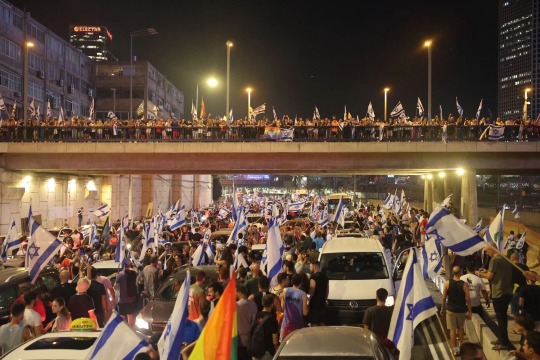
Demonstrators block a highway during a protest against the Israeli government's judicial reform plan in Tel Aviv on July 24. Jack Guez/AFP Via Getty Images
Kaplan Street is one of the main thoroughfares leading into and out of Tel Aviv. It was built along the outline of a German Templar colony, whose pro-Nazi descendants were expelled from British Mandate Palestine during World War II. During the 1960s and 70s, it was filled with Israeli governmental and cultural institutions, such as the Jewish Agency and the Israel Journalists Association. These days, Kaplan is the street where, every Saturday, hundreds of thousands of Israelis protest the attempted judicial coup led by the coalition of Prime Minister Benjamin Netanyahu.
Contrary to the common version in the global press, the protesters are not only the scions of the old, privileged establishment. Those gathering on Kaplan are a big tent, including both the financially comfortable and the struggling. While some of the protest movement leaders are military elites or tech moguls, many others are not. The most vulnerable of them are set to become the main casualties of Netanyahu’s judicial coup. That’s because their children, who study in the public school system, may witness its slow collapse due to funds being redirected to the religious and ultra-Orthodox institutions.
Their kids, who—unlike most ultra-Orthodox Jews—serve a full term in the Israel Defense Forces (IDF), will sit idle at home because in Israel, there is no public transport on the Sabbath. Single mothers will have their state support reduced in favor of ultra-Orthodox families with multiple children. People who live in peripheral areas will have to struggle against an ultra-Orthodox takeover of their towns. The first step will be a political takeover of the municipalities, followed by massive benefits to the ultra-Orthodox population. According to reports, this process is already happening in cities such as Tiberias, Safed, Arad, and Mitzpe Ramon.
They are Jews, Palestinians, men, women, native Israelis, and immigrants who arrived from developing countries via the Law of Return. The common denominator for all of them is the struggle against turning into a so-called donkey.
In Jewish tradition, the Messiah’s Donkey refers to the donkey upon which the Messiah will arrive at the end of days. In Israel, the phrase refers to the doctrine ascribed to the teachings of Abraham Isaac Kook: The secular Jews, who represent the material world, are an instrument in the hands of God whose purpose was to establish the state of Israel and begin the process of redemption. Upon Israel’s establishment, the secular Jews would be required to step aside and allow the religious to govern the state.
Kook, who immigrated to Ottoman Palestine from what is now Latvia in 1904, is considered one of the spiritual fathers of religious Zionism. According to him, the Zionist enterprise was a new historical development of the era of redemption. Nevertheless, Kook was terrified of secularism. He believed that secular education had “sinned greatly against the spirit of Israel” and represented “the beginning of the decay and the basis of all bad assimilation.” Kook sought to settle the contradiction. The secular Zionists, he wrote, are allowed to be the bricks of the building of redemption, “but when the secret of the righteous is to be revealed,” it would be easy to differentiate “between God’s servants and those who are not.”
“Ben-Gurion’s compromises with ultra-Orthodox parties turned out to be a disaster for secular Israelis.”
Unlike Kook, Israel’s founder David Ben-Gurion was an atheist. He came from a religious background and respected Jewish heritage. At the end of the 1950s, a Bible study group gathered in his house, and the prophets were his favorite biblical characters. Nevertheless, Ben-Gurion did not attend synagogue and used to travel on the Sabbath. He made compromises with ultra-Orthodox parties only because of political constraints. It turned out to be a disaster for secular Israelis.
Kook’s prediction is about to come true, with one difference: Israel will not be a theocracy. It will be a country using religious law to allow profound corruption. In the past six months, there have been many reports on improper political appointments within the Likud party and its religious partners. Some of the coalition members have past criminal convictions, and there are reports of improper past conduct by others. And the country’s transformation into a corrupt religious state won’t only strengthen its ideological rivals—Israel is also a potential international drug trade route; such a shift may boost organized crime.
Over the next decade, the government plans to increase the budget of ultra-Orthodox educational institutions by 40 percent. This will make Israel the first country in the developed world that incentivizes schools that barely teach core subjects such as math, science, and English. The governmental supervision of ultra-Orthodox schools is weak, leaving vague information available about their curriculum. But according to sources in the education ministry, these schools teach primarily religious topics: the Talmud, Mishna and Torah.
English, math, and even Hebrew are studied at an elementary level. In addition, more than $600 million of the coalition budget will be dedicated to empowering Jewish identity among students in the state education system, IDF soldiers, university students, and residents of secular and liberal cities. Aryeh Deri, the head of the ultra-Orthodox Shas party, a convicted tax evader and one of the most powerful politicians in the coalition, plans a series of laws that might allow the ultra-Orthodox to take over secular towns politically.
Meanwhile, secular Israelis will pay six times more in taxes than the ultra-Orthodox, who constitute only 8 percent of the Israeli workforce. Their children will be obligated, as they are today, to serve a full term in the army (three years for men and two for women), while so-called national-religious men can serve in the army for a reduced term and most ultra-Orthodox are exempt.
Despite these facts, since the country’s founding, the secular population has been deprived of some basic liberties. This is because Israel has never created a constitution separating church and state. As a result, among other things, the Orthodox Chief Rabbinate holds a monopoly on marriage, which forces many secular Israelis to get married in other countries, or even online. Israel has no formal public transportation on Saturdays, which strands the millions of residents who don’t own a car.
“The liberals are beginning to realize that they will be used as the donkey up to the moment Israel is subjected to religious law,” said Yair Nehorai, a lawyer and the author of The Third Revolution, a book documenting the teachings of the rabbinic mentors of the messianic movement. “But this realization,” he noted, “is too difficult.”
“They will no longer be the majority in the country within a few decades, and they will have to say: This is not my country,” Nehorai said.
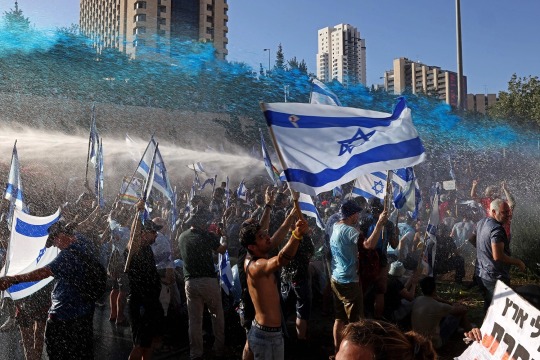
Israeli security forces use a water cannon to disperse demonstrators blocking the entrance of the Knesset, Israel's parliament, in Jerusalem on July 24. Ronaldo Schemidt/AFP via Getty Images
The idea of dividing Israel into cantons, which for years has been received with mockery due to the country’s small size and security challenges, has been gaining more and more traction over the past few months, and liberals are angrily calling to separate “Israel” from “Judea.” For some, Judea means the occupied territories. For others, Judea represents all ultra-Orthodox and messianic Jews, whether they live in Bnei Brak (in Israel proper) or Hebron (in the West Bank).
Sagi Elbaz, the author of Emergency Exit: From Tribalism to Federation, the Road to Healing Israeli Society, told me that these cantons will begin with the liberal Israeli cities. “A secular rebellion manifested itself, for example, when the municipalities of Tel Aviv and several other liberal cities launched a network of bus routes that operate on the Sabbath,” he explained.
Until recently, Kaplan Street appeared to welcome protesters of all stripes. Next to No. 8, where the offices of the tech company Fiverr are located, CEO Micha Kaufman hands out free water bottles. Not far from Kaplan 17-19 stand the protesters of the “Anti-Occupation Bloc,” forcing passers-by to acknowledge the elephant in the room with signs such as “No Democracy with Occupation.” Kaplan 22 looks like the mother base of “Women Building an Alternative,” whose photos dressed as handmaids from Margaret Atwood’s dystopian novel A Handmaid’s Tale have gained worldwide publicity. Next to them are the members of “The Pink Front,” who have ironically swapped the Israeli blue-and-white flag for a pink-and-white one.
At the end of Kaplan and on the adjacent Namir Street, you can find the unironic blue-and-white. And khaki. This is the center of activity for “Brothers in Arms—Warriors Journeying to Save Democracy,” a grassroots umbrella organization that includes several reservist groups.
Israeli researchers have often noted that, compared to developed Western countries, Israel struggles with establishing a free and open civil society, as the Israelis are attached at the hip to their army. Despite this, the veterans demonstrating on Kaplan are not all the same: Some served in the special forces. Others spent three unremarkable years, mostly killing time. Some veterans abused their power over the Palestinians. Others were discharged with physical and mental scars.
Some believe that serving in the occupied territories is a critical security goal. Others feel that they were forced to go there, but never came out in public to say so. Some of them committed acts of heroism. A few others proved their heroism by refusing to commit acts that they have deemed immoral.
“This is the Most Irresponsible Government in the History of Israel.”
Brothers in Arms, the embodiment of the liberal side of the “People’s Army,” has the most leverage of any group in the Israeli protest movement. Now, with the coalition resuming its legislative blitz, special forces veterans have declared that hundreds of them will stop volunteering for reserve duty. The number of objectors is rising. Former directors of special intelligence operations have warned that units across the IDF, the Shin Bet and Mossad are angry and in a state of unrest.
Reserve Col. Ronen Koehler, one of the Brothers in Arms coordinators, told Foreign Policy that until mid-March, “we were just another activist group.” But in the time since, “we received a flood of phone calls from reservists who were expecting us to tell them what to do about their service.” There were questions from high-ranking commanders who have an in-depth understanding of Israel’s strategic infrastructure: What if you are ordered to shoot in a way you were never ordered to before, and you are experienced enough to know that you shouldn’t do it? What happens if a submarine crew is not sure that the person who sent them to sea is trustworthy?
“The flood of phone calls made us realize that something bigger than our protest activities was happening here,” said Koehler, who served as a submarine captain and is a former vice president at Checkpoint, a U.S.-Israeli hardware and software products company.
The government reached the same realization. A secret report that was submitted to Defense Minister Yoav Gallant caused a temporary halt of the judicial coup at the end of February, but it has now resumed with the passage of a law limiting judicial review on Monday—sparking even larger protests.
As successful as the protests have been, liberal civil society and the army veterans struggle to see eye to eye. For various reasons, some practical (to attract right-wing voters) and some ideological, the occupation is barely mentioned in speeches along the Kaplan encampment, and the number of Palestinian-Israelis joining the protests is low.
“The law could grant unlimited power to white-collar criminals, members of organized crime families, cocaine addicts, or messianic fundamentalists.”
Recently, the Anti-Occupation Bloc, which usually demonstrates far from the main stage, decided to pass through the main avenue. The protesters carried a massive sign reading: “We Must Resist Settler Terror.” Some of the Brothers in Arms tried to forcefully remove the sign. After a time, they published a half-hearted apology, and a few days later, they met with Anti-Occupation Bloc representatives to settle matters peacefully.
Some protest participants hate each other, while others love each other. Some are caught in love-hate relationships. “We should be glad about the greatest achievement we got: the creation of a new kind of centrist identity,” Koehler said. “This center includes various shades, from the capitalist, hawkish right that believed in Netanyahu so far but not anymore, through the liberal center and up to the social-democratic left.”
“The protest doesn’t have intrinsic content yet,” Nehorai admitted. “But when a serving coalition is acting in a frenzy, it makes us feel, every minute of every day, that we are connected. The liberal camp is a country that is just being formed.”
All Israelis are facing legislation that will grant unlimited power to anyone the government chooses; they could be white-collar criminals, rehabilitated members of organized crime families, cocaine addicts, or messianic fundamentalists.
A growing number of Israeli liberals, especially younger ones, will soon start negotiating the cargo loaded on their backs, the identity of the hand holding the reins, and the direction of travel. And ultimately, they will refuse to continue being used as donkeys.
— Gitit Ginat is a Freelance Journalist and a former writer for Haaretz.
#Argument#Protesters#Corrupt Theocracy#Gitit Ginat#Foreign Policy#Isra-hell 🇮🇱#Judicial Reform#Jewish Agency#British 🇬🇧 Mandate Palestine 🇵🇸#Israel Journalists Association#PM Benjamin Setan-yahu#Ultra-Orthodox Jews#Abraham Isaac Kook#Ottoman Palestine#Zionism#Secular Zionists#David Ben-Gurion#Talmud Mishna and Torah#Orthodox Chief Rabbinate#Ultra-Orthodox and Messianic Jews#Micha Kaufman#Anti-Occupation Bloc#Sagi Elbaz#People’s Army#Col. Ronen Koehler#Defense Minister Yoav Gallant#We Must Resist Settler Terror
4 notes
·
View notes

